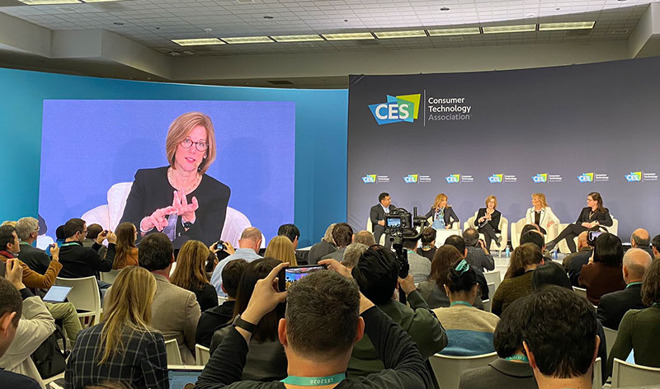Jane Horvath, Apple's senior director of global privacy, took part in a privacy-centric panel at CES in Las Vegas on Tuesday, where she lauded the company's initiatives to protect customer data and defended its stance on hardware encryption.

Jane Horvath participates in privacy roundtable at CES 2020. | Source: Parker Ortolani via Twitter
Apple's staunch belief that customer data should remain obfuscated -- even from Apple itself -- was questioned during the roundtable, as Horvath was asked about recent revelations regarding a Federal Bureau of Investigation request for assistance in an ongoing investigation.
On Monday, the FBI sent a letter to Apple asking for help in the extraction of data from two iPhones believed to have been used by Mohammed Saeed Alshamrani. Alshamrani is suspected of killing three people in a shooting at the Naval Air Station in Pensacola, Fla, in December.
Horvath toed the company line, defending Apple's implementation of strong hardware encryption, reports CNBC.
As she explained, iPhone's encryption mechanism is designed to keep personal information safe from prying eyes.
Once a device is locked, data stored within cannot be accessed without successful entry of a predetermined passcode or password. While Apple can with a proper warrant delve into data stored offsite, such as its iCloud cloud storage service, the company is unable to break into an iPhone without writing custom software, also known as a backdoor.
Apple vehemently argued against the creation of backdoors when the FBI requested assistance in accessing an iPhone tied to the San Bernardino terror attack in 2016. Horvath repeated those vows on Tuesday, saying strong encryption is an effective method of ensuring sensitive information stays private.
"Our phones are relatively small and they get lost and stolen," Horvath said. "If we're going to be able to rely on our health data and finance data on our devices, we need to make sure that if you misplace that device, you're not losing your sensitive data."
While Apple offers assistance to law enforcement agencies, and fields a team to specifically handle such requests, Horvath does not support the creation of backdoors.
"Building back doors into encryption is not the way we are going to solve those issues," she said.
Horvath went on to tout Apple technologies like differential privacy, user randomization for first-party services like Maps, and minimal data retrieval for Siri.
Facebook VP of Public Policy and Chief Privacy Offer for Policy Erin Egan, Procter & Gamble Company Global Privacy Officer Susan Shook and Federal Trade Commission Commissioner Rebecca Slaughter were also on stage during the discussion moderated by Rajeev Chand, Partner and Head of Research at Wing Venture Capital.
Horvath began work as Apple's privacy czar in September 2011 and entered the public eye when she attended a so-called "spy summit" to discuss data privacy and mass surveillance issues in 2015. It was around that time that Apple began to ratchet up its rhetoric on privacy in consumer tech. Prior to Apple, Horvath acted as Google's Global Privacy Counsel.


